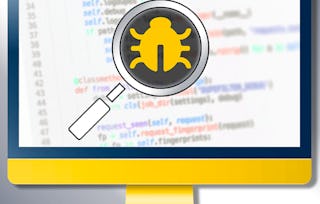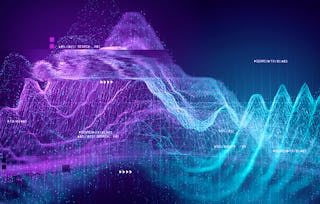In the capstone, students will build a series of applications to retrieve, process and visualize data using Python. The projects will involve all the elements of the specialization. In the first part of the capstone, students will do some visualizations to become familiar with the technologies in use and then will pursue their own project to visualize some other data that they have or can find. Chapters 15 and 16 from the book “Python for Everybody” will serve as the backbone for the capstone. This course covers Python 3.

Capstone: Retrieving, Processing, and Visualizing Data with Python

Capstone: Retrieving, Processing, and Visualizing Data with Python
This course is part of Python for Everybody Specialization

Instructor: Charles Russell Severance
319,457 already enrolled
Included with
14,366 reviews
What you'll learn
Make use of unicode characters and strings
Understand the basics of building a search engine
Select and process the data of your choice
Create email data visualizations
Skills you'll gain
Details to know

Add to your LinkedIn profile
1 assignment
See how employees at top companies are mastering in-demand skills

Build your subject-matter expertise
- Learn new concepts from industry experts
- Gain a foundational understanding of a subject or tool
- Develop job-relevant skills with hands-on projects
- Earn a shareable career certificate

There are 7 modules in this course
Congratulations to everyone for making it this far. Before you begin, please view the Introduction video and read the Capstone Overview. The Course Resources section contains additional course-wide material that you may want to refer to in future weeks.
What's included
4 videos5 readings1 assignment
This week we will download and run a simple version of the Google PageRank Algorithm and practice spidering some content. The assignment is peer-graded, and the first of three optional Honors assignments in the course. This a continuation of the material covered in Course 4 of the specialization, and is based on Chapter 16 of the textbook.
What's included
6 videos2 readings1 app item
The optional Capstone project is your opportunity to select, process, and visualize the data of your choice, and receive feedback from your peers. The project is not graded, and can be as simple or complex as you like. This week's assignment is to identify a data source and make a short discussion forum post describing the data source and outlining some possible analysis that could be done with it. You will not be required to use the data source presented here for your actual analysis.
What's included
2 videos2 readings1 discussion prompt
In our second optional Honors assignment, we will retrieve and process email data from the Sakai open source project. Video lectures will walk you through the process of retrieving, cleaning up, and modeling the data.
What's included
5 videos1 reading1 app item
The task for this week is to make a discussion thread post that reflects the progress you have made to date in retrieving and cleaning up your data source so can perform your analysis. Feedback from other students is encouraged to help you refine the process.
What's included
1 video1 reading1 discussion prompt
In the final optional Honors assignment, we will do two visualizations of the email data you have retrieved and processed: a word cloud to visualize the frequency distribution and a timeline to show how the data is changing over time.
What's included
3 videos1 reading1 app item
This week you will discuss the analysis of your data to the class. While many of the projects will result in a visualization of the data, any other results of analyzing the data are equally valued, so use whatever form of analysis and display is most appropriate to the data set you have selected.
What's included
2 videos3 readings1 discussion prompt
Earn a career certificate
Add this credential to your LinkedIn profile, resume, or CV. Share it on social media and in your performance review.
Instructor

Offered by
Explore more from Data Analysis
 Status: Free Trial
Status: Free TrialArizona State University
 Status: Free Trial
Status: Free TrialUniversity of Michigan
 Status: Free Trial
Status: Free TrialUniversity of California San Diego
 Status: Free Trial
Status: Free TrialDuke University
Why people choose Coursera for their career

Felipe M.

Jennifer J.

Larry W.

Chaitanya A.
Learner reviews
- 5 stars
82.42%
- 4 stars
12.26%
- 3 stars
3.33%
- 2 stars
1.02%
- 1 star
0.94%
Showing 3 of 14366
Reviewed on Apr 28, 2020
Now I understand how data mining, API's and dumping and retrieving data from a database works. Excellent course to start understanding how python can be used to work with data sources on the internet.
Reviewed on Mar 22, 2019
This is a great course. I like this course very much because I can retrieve, process and visualize data in Python in a very good way I never used before. This course is very useful in real world.
Reviewed on Apr 19, 2017
Excellent, simply the best experience of on line education I have had, the course is extremely complete and useful, the support of the staff of mentors is remarkable also, I am extremely grateful.

Open new doors with Coursera Plus
Unlimited access to 10,000+ world-class courses, hands-on projects, and job-ready certificate programs - all included in your subscription
Advance your career with an online degree
Earn a degree from world-class universities - 100% online
Join over 3,400 global companies that choose Coursera for Business
Upskill your employees to excel in the digital economy
Frequently asked questions
To access the course materials, assignments and to earn a Certificate, you will need to purchase the Certificate experience when you enroll in a course. You can try a Free Trial instead, or apply for Financial Aid. The course may offer 'Full Course, No Certificate' instead. This option lets you see all course materials, submit required assessments, and get a final grade. This also means that you will not be able to purchase a Certificate experience.
When you enroll in the course, you get access to all of the courses in the Specialization, and you earn a certificate when you complete the work. Your electronic Certificate will be added to your Accomplishments page - from there, you can print your Certificate or add it to your LinkedIn profile.
Yes. In select learning programs, you can apply for financial aid or a scholarship if you can’t afford the enrollment fee. If fin aid or scholarship is available for your learning program selection, you’ll find a link to apply on the description page.
More questions
Financial aid available,

